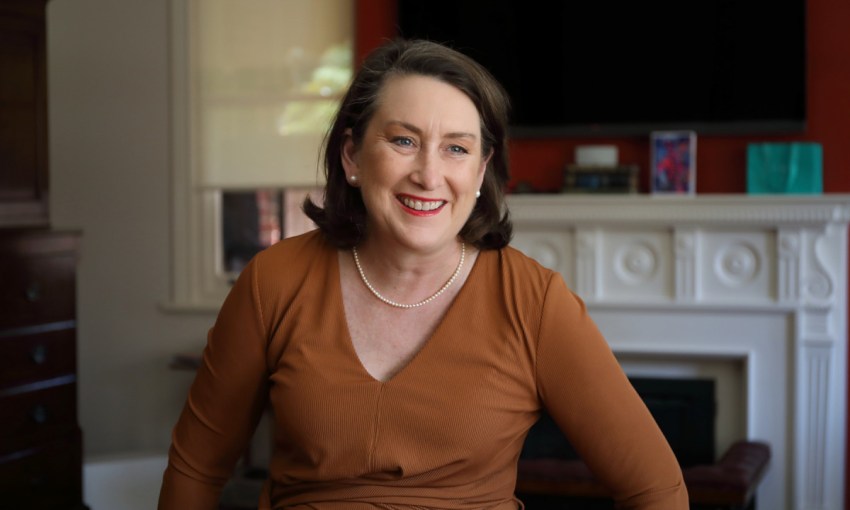Susan Neuhaus is an Adelaide surgeon and ex-army officer who has operated in war zones, helped sex workers in Cambodia and been awarded the Conspicuous Service Cross. Here she talks about her life – from childhood in Mt Gambier, to the fortuitous way she found herself in medical school, to her challenges in the military and as a cancer surgeon.
My longest day: I don’t really remember it beginning and ending
I was born in Adelaide, and went to primary school in Mt Gambier, and then Pembroke for secondary school. I was what might be described as a bookish child. I have an older brother and two much younger siblings. My childhood was very much typical for the day – walking to school, free milk at recess and singing the national anthem at assembly. At weekends we weren’t allowed back in the house unless it was raining or until we had completed all our chores, so I spent most of my time exploring the Lakes or immersed in books.
One of my most vivid childhood memories is walking with my brother to the corner store to buy a brick of ice cream, wrapped up in newspaper. We had to get back quickly enough before it melted and put it into the freezer shelf of our old Kelvinator (which just fitted ice cream, frozen peas and nothing else).
When I finished school I applied to become a nurse. I had two interviews and they both rejected me. I remember this guy came to fix our gas and I told him I’d applied for nursing and he misheard me and thought I said medicine. I was too polite to correct him and by the time we’d finished the conversation I thought: “I’ll have to go and change my university preference forms.” I think there may have been a bit of planetary influence there.
I got into medicine at Adelaide University and I loved uni life more than the study. I got the world’s lowest recorded mark for physics in my first term and had to sit a supposedly unfailable open-book exam three times!
I was in fifth year of medical school when I made the life-defining decision to join the army. I guess I was looking for something different. I thought I might end up doing tropical medicine.
So, I signed up as a medical undergraduate and lived in the Keswick Barracks and then did my intern year. It then first dawned on me that I wanted to do surgery and the army gave me special leave to study surgery in London for two years. Then I came back and took up my first proper army job at Kapooka, the recruit-training base out of Wagga Wagga, and loved it.
It was really the home of regimental training and a place where army values are inculcated, and I was the Regimental Medical Officer. I did my officer training at the Jungle Warfare Centre in Canungra in Queensland, including obstacle courses, marching on parade and learning how to shoot.
It is really hard to pin down why I joined the military – it’s part of the collegiality and the common purpose and you just all work together as a team. I have worked in Cambodia, Bougainville, Afghanistan, New South Wales and Queensland (on an army helicopter base) with the army.
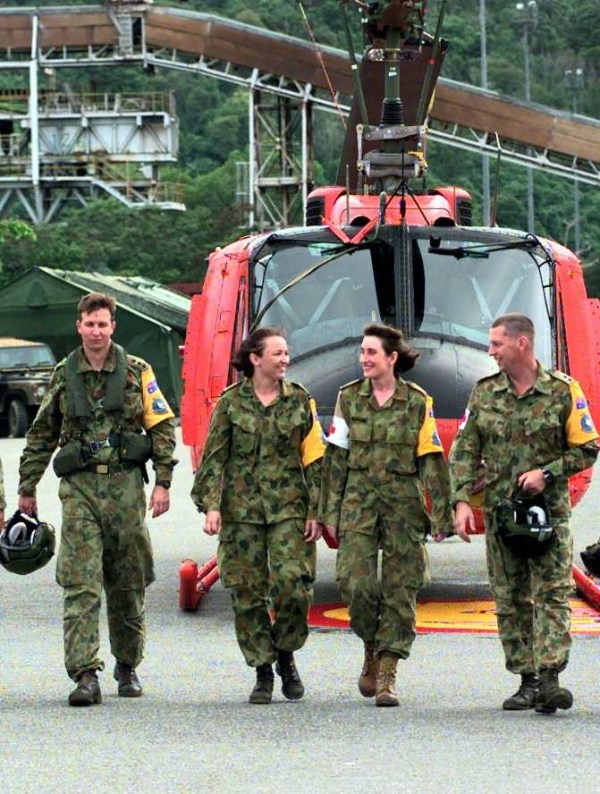
I married a wonderful ex-army helicopter pilot, Peter, and we have two beautiful teenage daughters, Grace and Emma. Peter is the most solid, loyal, steadfast man and I consider myself blessed.
Army life and being away from my family wasn’t always easy. I still regard a cold February morning in 2009 and the aftermath of a suicide bombing in Tarin Kowt (Afghanistan) as my single longest day and a day where I learned a lot about myself, my team and the need to find forgiveness within.
The specialist medical team was from Australia. I was the general surgeon; Dr Rob Baird from Adelaide was the orthopaedic surgeon. We also had an anaesthetist and an intensive care nursing team. I had been involved with training the teams to go to Afghanistan so I knew what I was getting myself into. By then I had two little girls at home – that was different for me, but we had our nanny live in and it was very much a controlled deployment in terms of the time I could be away.
A suicide bomber had detonated a bomb at the police barracks in the town. The target was probably the Australian Federal Police but they were still with us on the parade ground. It’s one of those things you train for but when it happens, like all battle plans, they last no longer than the first shot and you end up improvising on the run. The first casualty I saw was a man with a brain injury: he was still conscious and still clothed. After that it all turns into a bit of a blur because my job that day was doing the triage, sorting who went where, how many can we get out, who can we operate on, but we only had one operating team (including me) so you can’t tie that team down on one person for too long or you’ve got no-one left.
How it is possible for people to descend into dark places as a society? I think we underestimate that.
So, I had to decide who gets treated, who has to wait, potentially forever, and who can you get out of the facility as quickly as possible. What was weird for me was working with a team I wasn’t familiar with. The facility was Dutch-led, the equipment was all in Dutch, the medications were all in Dutch, so there were language issues. Then we also had a Singaporean team so that was a challenge. Then out of the dust emerged strange individuals with long beards wearing US or Australian uniforms – I had no idea who they were but they were “here to help”. It turned out they were from a medical facility down the road.
I referred to it as my longest day because I don’t really remember the day beginning and ending. It didn’t end for several days. There were some very important learnings for all of us. I think one of the most important things is to be forensic about the way you go through these events afterwards and be open to looking at all the ways you could have done it better. But then you have to separate yourself from that and accept your own humanity and forgive yourself for decisions you may have made differently. I think it’s very easy for people who are sitting in armchairs a long way from things to see how they would have done things differently, but when you are in the middle of it, you have a group of people who are using all their training and just trying to do the best they can.
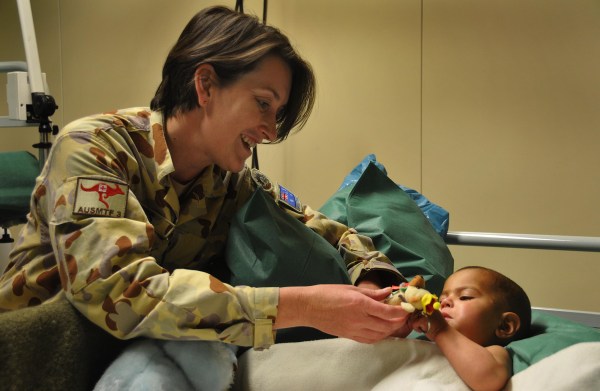
Susan Neuhaus gives an Afghan child a toy to play with during her rounds of a hospital ward based in Camp Holland near Tarin Kowt, Afghanistan. Photo by Captain Lachlan Simond
One of my more unusual jobs was inspecting brothels in Cambodia in 1993 at the height of the AIDs epidemic, the time of the “Grim Reaper” ads.
I was with the Australian Army as part of a UN deployment at a time when AIDS was a death sentence. The prostitutes were very young. The UN came under enormous criticism for leaving a legacy of HIV in Cambodia and in fairness it probably did because some of the nationalities did have high HIV rates and other sexually transmitted diseases.
So, I had to go into the brothels and have conversations with the girls about condoms. The brothels were often little bamboo shelters on the side of the road with a curtain, and the girls would sit out the front with their white-painted faces. Some of these girls were just teenagers and many had been “sold” by their families. These are the casualties of war in such a different way.
I am always struck by how much a cancer diagnosis, no matter how tragic and difficult at the time, often contains a gift of changing priorities, reassessment of lives and healing of relationships that otherwise might never have occurred.
The most striking thing for me then was seeing a country like Cambodia emerging from conflict with no infrastructure. There was no functioning legal system, police, education, just kids everywhere with missing limbs and lots of orphanages. How do you bring order into that degree of chaos?
How it is possible for people to descend into dark places as a society? I think we underestimate that. For example, if there was a car accident it would not be uncommon for a dead person to be left by the side of the road. They would be ransacked and their belongings stolen but as a person they no longer had any value. That is very confronting. I still remember when a guy was hit by an armoured vehicle out the front of our facility and while I was working on him, all my drugs were stolen from behind me. They were for sale the next day in the market and I was furious. I understand how people get to that point but I was 27 at that time and the different value that people put on life was deeply confronting.
Eventually, we made the decision to settle back in Adelaide post my full-time army career and I have never regretted it. Adelaide is such a wonderful place to bring up a family and to do business.
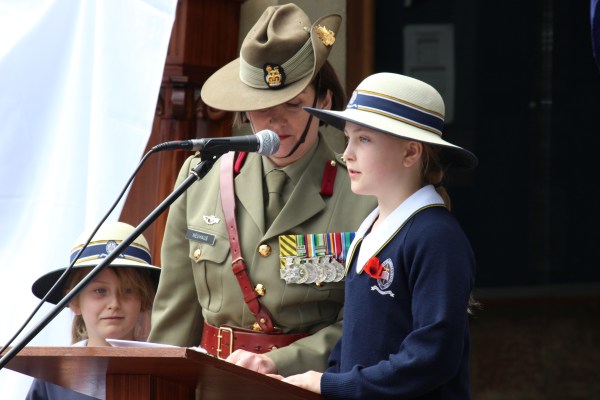
One of my proudest most humbling moments was being asked to give the 2018 Anzac Dawn Service address to the nation in Canberra. It challenged me, terrified me and humbled me on so many levels – especially when at 4am that morning my daughters’ advice was, “no pressure – just don’t stuff up, Mum!”.
My day job these days is as a surgeon. I practice in the area of surgical oncology, which is cancer surgery, dealing mostly with advanced malignant melanoma and soft tissue (sarcoma) surgery. What I love most are the patients, the challenges and the uniqueness of it. Sarcoma surgery in particular is rarely templated and, because sarcomas are rare, every case needs to be planned, structured and organised individually.
Despite the fact that I write a lot of condolence cards to families, it is a huge privilege to travel with them through a cancer diagnosis, surgery, and often (but not always) for decades of follow-up. I am always struck by how much a cancer diagnosis, no matter how tragic and difficult at the time, often contains a gift of changing priorities, reassessment of lives and healing of relationships that otherwise might never have occurred.
I still find the hardest things to deal with are either unexpected death in the operating theatre or resuscitation bay – when you have done everything possible but at the end of the day it wasn’t enough. Even more difficult though are the discussions about not treating – Western medicine is limited and sometimes there is nothing we can really offer to make someone better (but plenty of options to make them worse). The reality of death is an inevitability that none of us escape. That can be hard, but it can also be beautiful.
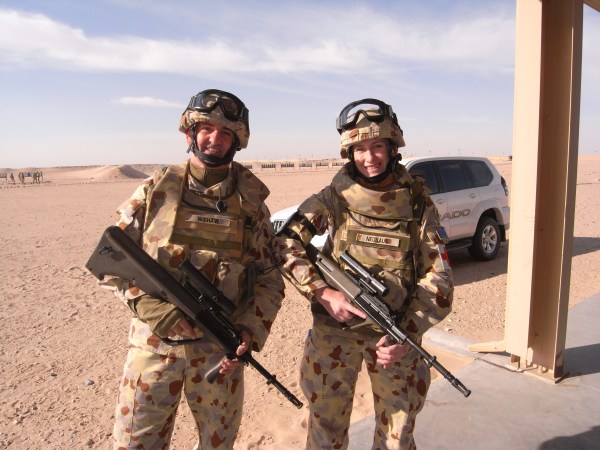
My role as a surgeon is fairly intense and I have always maintained a diversified career portfolio including roles within the veteran community, as a not-for-profit Director and an academic.
I love to read and I love to write. I have co-written a book, Not for Glory, about our pioneering female army surgeons and doctors. It was adapted by The Shift Theatre into an amazingly moving play that has been performed at both the Adelaide and Edinburgh Fringe Festivals.
I am passionate about sharing the stories of amazing women who have achieved so much and done so much for this country because we don’t, as a nation, know their stories. There are generations who never knew they existed or the prejudice that they had to overcome simply to do their job.
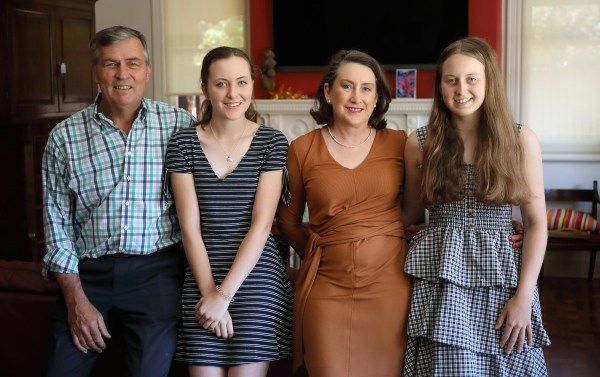
I am also passionate about creating flexible surgical training options. South Australia should be proud of supporting the first of these positions, despite some bureaucratic challenges. Surgery is a technical profession and to take time off is fine but to come back is hard and to come back with a small child at home is incredibly difficult. If we can keep these surgeons working part-time it enables them to manage both their children and their surgical training through that “hump” period without having to take extended leave.
Today, what brings me most joy are the conversations with my teenage daughters. They are at such a wonderful age and they enjoy sharing and debating issues about books, climate change, feminist politics and ancient history. It is just such a pleasure and challenging too. To watch them grow into the women they will become is truly joyful (…most of the time!).
My South Australian Life is a new first-person series, published each Sunday.



